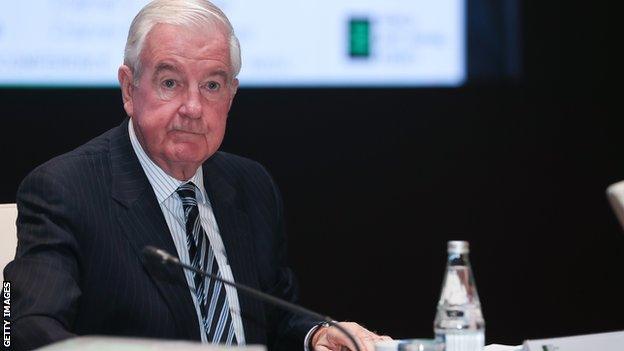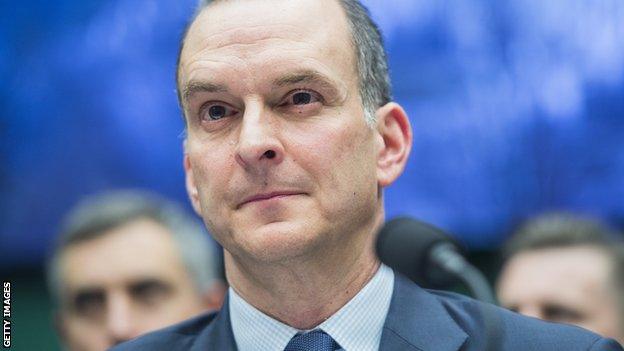Russian doping: Wada vice-president wants 'rapid' action after deadline missed
- Published
Helleland wants to be the next Wada president
The World Anti-Doping Agency should act "rapidly" after Russia's anti-doping agency missed a deadline to hand over data from its Moscow laboratory, says vice-president Linda Helleland.
Rusada was set a 31 December deadline to comply, but Wada's inspection team were denied full access to samples.
The country could now be at risk of another ban from international events.
Helleland told BBC Sport she was "extremely disappointed but not surprised" Russia did not comply.
The Norwegian politician added that a Wada panel should convene "immediately" to decide whether Russia should be suspended again.
Wada says it will refer the issue to its compliance review committee (CRC), an independent body that will next meet on 14 January in Canada, after which it will make a recommendation to Wada's executive committee (ExCo).
Wada's athlete committee said it was "extremely disappointed" the deadline was missed and that it expected Russia to be declared non-compliant following the process recommended by the CRC.
"Only this action will be suitable and appropriate in the view of the athletes - anything less will be considered a failure by Wada to act on behalf of clean athletes," it said.
Helleland opposed Wada's reinstatement of Russia in September following a state-sponsored doping scandal but was out-voted on the body's executive committee.
"I am extremely disappointed that Russia did not deliver within the more than three-month time frame they had at their disposal to extract the data," she said.
"Having said that, I am not surprised, this process has unfortunately been going on for years."
Wada president Sir Craig Reedie said he was "bitterly disappointed" after it was confirmed Rusada had missed the deadline and that "the process agreed by Wada's ExCo in September will now be initiated".
Helleland added: "We at Wada must act very rapidly on the actual situation and a decision by the Wada CRC and ExCo should not be delayed - I've strongly suggested that the CRC convene via a teleconference immediately.
"As soon as we receive a recommendation from the CRC, a teleconference should be organised with the ExCo so that we can discuss and decide on the situation without any further delay."

Wada president Sir Craig Reedie had said he was "confident" of Russia complying with the deadline
UK Anti-Doping (Ukad) said it was "deeply concerned" by the development, with a statement saying: "Uninhibited access to the Moscow laboratory and the athlete 'LIMS' data, was the first condition of Wada's reinstatement of Rusada in September 2018. At the same time the process to be followed once the 31 December deadline passed was set out.
"The independent Compliance Review Committee (CRC) must now complete its work, and Ukad keenly awaits its recommendation to Wada's executive committee."
United States Anti-Doping Agency (Usada) chief Travis Tygart said the episode was "a total joke and an embarrassment for Wada".
He urged Wada to "stop being played by the Russians" and said Rusada should be declared non-compliant.
The US is one of 16 national anti-doping bodies (Nado) who have called on Wada to suspend Russia.
"Russia must be held accountable for its continuing failure to comply," Nado leaders said in a statement.
"After more than three years of review, indecision and compromise in response to the worst doping scandal in the history of sport, the time has come to demonstrate that no individual nor nation is exempt from compliance with the World Anti-Doping Code."
The UK Anti-Doping Athlete Commission also demanded Russia's immediate suspension by Wada.
But International Olympic Committee president Thomas Bach seemed to suggest Russia was not in danger of being suspended for the 2020 Olympics in Tokyo.
He said: "With its suspension from the Olympic Winter Games Pyeongchang 2018, the Russian Olympic Committee has served its sanction, while in other organisations procedures are still ongoing."
Wada president Reedie said: "I am bitterly disappointed that data extraction from the former Moscow laboratory has not been completed by the date agreed.
"Since then, Wada has been working diligently with the Russian authorities to meet the deadline, which was clearly in the best interest of clean sport."
In September, Wada controversially lifted its suspension of Rusada - which was imposed in November 2015 - pending the meeting of conditions in a "roadmap to compliance".
One of the conditions was to allow independent access to the raw data held at the Moscow lab, and in November Reedie had said it was "very hard to believe" Russian authorities "won't deliver".
But Wada said on 21 December it had been unable to "complete its mission".
The state-sponsored use of performance-enhancing drugs by Russians in Olympic and Paralympic sports emerged in independent reports in November 2015, and July and December 2016.

United States Anti-Doping Agency chief Travis Tygart helped bring down disgraced US cyclist Lance Armstrong
Wada needs to 'stop being played by the Russians'
Usada's Tygart, who brought down disgraced former US cyclist Lance Armstrong, called on Wada to reinstate a ban on Russian athletes.
He said: "In September, Wada moved the goalposts and reinstated Russia against the wishes of athletes, governments and the public.
"In doing this, Wada guaranteed Russia would turn over the evidence of its state-supported doping scheme by 31 December.
"No-one is surprised this deadline was ignored and it's time for Wada to stop being played by the Russians and immediately declare them non-compliant for failing yet again to meet the deadline."
The UK Anti-Doping Athlete Commission said Rusada must again be declared non-compliant and suspended.
On 13 September, the group wrote an open letter to Wada saying to readmit Russia without meeting the conditions it had been set would be "a catastrophe for clean sport".
Now those terms have not been met, it said: "The Russian state needs to prove unequivocally that they have learned from the biggest doping scandal under Wada's watch, and that they will from this date forward be committed to a drug-free, transparent regime across international sport.
"Otherwise, the Wada compliance review committee and the Wada executive committee must immediately declare Rusada non-compliant.
"Wada's leadership has the opportunity to stand up for the interests of athletes, their families, their fans and their sport. We trust that those we look to for leadership will demonstrate their resolve and commitment to clean sport.
"In the name of sport, it is time to do what is right."
How the scandal unfolded
December 2014: As many as 99% of Russian athletes are guilty of doping, a German TV documentary alleges.
November 2015: A Wada commission publishes an independent report alleging widespread corruption, amounting to state-sponsored doping in Russian track and field athletics. Rusada is declared non-compliant.
May 2016: Former Moscow anti-doping laboratory boss Grigory Rodchenkov,, external who has turned whistleblower, says dozens of Russian athletes at the 2014 Winter Olympics in Sochi had cheated.
July 2016: Russia operated a state-sponsored doping programme for four years across the "vast majority" of summer and winter Olympic sports, says a report from Professor Richard McLaren.
August 2016: International Olympic Committee (IOC) decides against imposing a blanket ban on Russian athletes at the 2016 Olympics in Rio. Individual sporting federations rule instead, with 271 Russians competing.
December 2016: Wada publishes the second part of the McLaren report which says more than 1,000 Russian athletes benefited from doping.
January 2017: Rusada and Russian sport authorities given list of criteria, external to achieve before winning back recognition.
March 2017: Wada says Russia's anti-doping reforms are not happening quickly enough.
February 2018: Russia are banned from competing at 2018 Winter Olympics in South Korea by the IOC, but 169 athletes who prove they are clean allowed to compete under a neutral flag.
May 2018: Wada writes to Rusada offering 'compromise' solution.
September 2018: News of the compromise, revealed by the BBC, prompts fury from athletes and doping bodies.